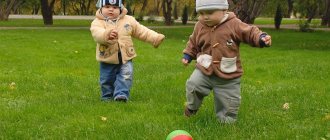Today, experts do not have any single version or theory that can give a comprehensive and indisputable idea of how a child’s mental development occurs.
Child psychology is a branch of psychology that studies the spiritual and mental development of children, the patterns of ongoing processes, studies instinctive and voluntary actions and developmental features starting from the birth of a child until maturity at 12-14 years.
Psychologists divide childhood into periods; the periodization of children’s mental development is based on the concept of leading activity, characterized by three main features:
Firstly, it must necessarily be meaningful, carry a semantic load for the child, for example, previously incomprehensible and meaningless things acquire a certain meaning for a three-year-old child only in the context of the game. Consequently, play is a leading activity and a means of meaning formation.
Secondly, basic relationships with peers and adults develop in the context of this activity.
And, thirdly, in connection with the development of this leading activity, the main new formations of age appear and develop, that range of abilities that allow this activity to be realized, for example, speech or other skills.
Leading activity is of decisive importance at each specific stage of children's mental development, while other types of activity do not disappear. They may become non-mainstream.
Stable periods and crises
Each child develops unevenly, going through relatively calm, stable periods, followed by critical, crisis ones. During periods of stability, the child accumulates quantitative changes. This happens slowly and is not very noticeable to others.
Critical periods or crises in the psychological development of children are discovered empirically, and in a random order. First, the crisis of seven years was discovered, then three, then 13 years, and only then the first year and the crisis of birth.
During crises, a child changes quickly in a short period of time, and the main features of his personality change. These changes in child psychology can be called revolutionary, they are so fast-paced and significant in the meaning and significance of the changes taking place. Critical periods are characterized by the following features:
- age-related crises in children arise unnoticed and it is very difficult to determine the moments of their onset and end. The boundaries between periods are unclear; in the middle of the crisis there is a sharp escalation;
- During a crisis, a child is difficult to educate, often conflicts with others, attentive parents feel his distress, despite the fact that at this time he is obstinate and unyielding. School performance and productivity decrease and, conversely, fatigue increases;
- the outwardly seemingly negative nature of the development of the crisis, destructive work occurs.
The child does not gain, but only loses from what he acquired before. At this time, adults should understand that the emergence of something new in development almost always means the death of the old. By looking closely at the child’s emotional state, one can observe constructive development processes even during critical periods.
The sequence of any period is determined by the alternation of critical and stable periods. The child’s interaction with the surrounding social environment is the source of his development. Everything a child learns is given to him by the people around him. At the same time, in child psychology it is necessary that learning proceeds ahead of schedule.
Development of empathy and sensitivity in childhood
As the child’s psyche grows, it develops and new components appear in it.
Empathy is the ability to understand your own and other people’s emotions and empathize with them. This ability is not innate, but is developed through interaction with others.
Numerous studies of the emotional sphere of children show that the rudiments of empathy are already present in early childhood. Thus, already in the first days of life, newborns begin to behave restlessly if they hear the crying of other children. Researchers consider this reaction a precursor to empathy.
At the age of six months, babies react to the excitement of their parents or other loved ones as if something was disturbing their own peace. They cry if another child bursts into tears nearby.
At one year of age, a new formation occurs called motor mimicry - a physical imitation of a certain suffering by a child who does not experience it himself. At the age of about two and a half years, motor mimicry gradually disappears in children. They begin to understand what is happening to other people.
At this stage of development, babies experience differences in their overall sensitivity to the emotional discomfort of others. Some children feel it acutely, others do not pay attention. In most cases, the difference in children's empathic (or unempathetic) behavior depends on the parent's parenting style.
In most cases, children whose parents pay attention to the suffering the child’s behavior has caused others are more empathetic. For example, instead of the phrase: “You did bad,” they say: “Just look how you upset him.”
Scientists also note that empathy in children develops as a result of observing how others react to the suffering of other people. By copying what they see, children develop their own set of reactions with which they can comfort an upset person.
An important stage in the formation of empathy is associated with the child’s awareness of his emotions and feelings. Understanding what is happening to him, the baby learns to better understand the feelings of other people. At this stage, parents should help the child realize and express what he is feeling.
For example, crying and grabbing parents’ legs when they need to leave home for a couple of hours is not a whim, but frustration and fear that the baby cannot express in words. In such a situation, mom or dad can sit down and calmly say, “I know you're upset. I also feel sad. I have to leave now, but I’ll be back soon, then you and I will go for a walk together.” This way parents can teach their child to talk about his feelings, acknowledge and accept them.
Empathy is the final stage of empathy formation. Empathy involves having a clear understanding of how another person is feeling. To develop this ability in a child, parents should discuss with him different situations from life, talk about what happens in a film or cartoon, a fairy tale.
Newborn crisis (0-2 months)
This is the first crisis in a child’s life; the symptoms of a crisis in a child are weight loss in the first days of life. At this age, a child is a maximally social being; he is unable to satisfy his needs and is completely dependent and, at the same time, deprived of means of communication, or rather, does not know how to communicate. His life begins to become individual, separate from the mother’s body. As the child adapts to others, a new formation appears in the form of a complex of revival, which includes reactions: motor excitement at the sight of approaching familiar adults; using crying to attract attention to oneself, i.e., attempts to communicate; smiles, enthusiastic “cooing” with the mother.
The revitalization complex serves as a kind of boundary for the critical period of the newborn. The timing of its appearance serves as the main indicator of the normality of the child’s mental development and appears earlier in those children whose mothers not only simply satisfy the child’s needs, but also communicate with him, talk, and play.
How promising is this scientific direction?
The development of child psychology is a priority for many scientists, since each generation of babies born has certain differences and characteristics that require a specific approach. Those methods that were used in raising children born in the 1990s are now considered quite outdated and require replacement. In parallel with this, psychology should help modern teachers create teaching methods that will achieve maximum effect and consolidate acquired knowledge.
Many issues in child psychology are related to the behavior of parents, but scientists began to pay much attention to this relatively recently. This is due to the relative youth of this scientific direction - it officially appeared only in the 19th century. Today, mothers and fathers play the most important role in parenting, so a large amount of research is emerging on how to help adults adapt to the appearance of a child in the house and get used to their new status. At the same time, researchers are discovering new questions every day in this industry that require answers, so this area will remain popular for a long time.
Infant age (2 months – 1 year)
At this age, the leading type of activity is direct emotional communication with adults.
The development of children in the first year of life lays the foundation for its further formation as a personality.
Dependence on them is still comprehensive; all cognitive processes are realized in relationships with the mother.
By the first year of life, the child pronounces the first words, i.e. the structure of speech action emerges. Voluntary actions with objects of the surrounding world are mastered.
Until one year of age, a child’s speech is passive . He has learned to understand intonation and frequently repeated phrases, but he himself still cannot speak. In child psychology, it is during this period that all the foundations of speech skills are laid; children themselves try to establish contacts with adults through crying, cooing, babbling, gestures, and first words.
After a year, active speech is formed. By the age of 1 year, a child’s vocabulary reaches 30, almost all of them have the nature of actions, verbs: give, take, drink, eat, sleep, etc.
During this time, adults should speak to children clearly and distinctly to impart correct speech skills. The process of language acquisition occurs more successfully if parents show and name objects and tell fairy tales.
The development of movements is associated with the child’s objective activity.
There is a general pattern in the sequence of movement development:
- moving eye, the child learns to focus on an object;
- expressive movements - a complex of revitalization;
- moving in space - the child consistently learns to roll over, raise his head, and sit down. Each movement opens up new boundaries of space for the child.
- crawling – this stage is skipped by some children;
- grasping, by 6 months this movement from random grasping turns into purposeful;
- object manipulation;
- a pointing gesture, a completely meaningful way to express a desire.
As soon as a child begins to walk, the boundaries of the world accessible to him rapidly expand. The child learns from adults and gradually begins to master human actions: the purpose of an object, methods of acting with a given object, the technique of performing these actions. Toys are of great importance in the assimilation of these actions.
At this age, mental development begins and a sense of attachment is formed.
Interaction between children
At different age periods, the interaction between children differs. If babies under one year old do not show any interest in their own kind, then closer to 1.5-2 years old, they willingly get acquainted with boys and girls of the same age. But not for playing together - peers are more likely to be of interest as living toys or an object for study.
After two years, children are already willing to play nearby, often sharing toys or taking other people’s. Conflicts may arise on this basis.
After three years, the game becomes socially oriented, and children include other participants in it. In a kindergarten or in the yard a whole bunch of children can play together. They distribute roles among themselves; if someone is dissatisfied with the one he has received, he can be indignant and demand another with his fists or tears.
Preschoolers often compare themselves with friends, and competition can develop between them. Short conflicts involving only physical force can escalate into long periods of resentment.
Until adolescence, friendship is situational. Even 11-12 year old children only 50% of the time call the same person their friend twice within two weeks.
Irina Sherbul
Early childhood (1-3 years)
At this age, the lines of mental development of boys and girls are separated. Children develop a more complete self-identification and understanding of gender. Self-awareness arises, claims for recognition from adults, a desire to earn praise and a positive assessment develop.
Speech develops further, and by the age of three the vocabulary reaches 1,000 words.
Further mental development occurs, the first fears appear, which can be aggravated by parental irritability, anger and can contribute to the child’s feeling of rejection. Excessive care from adults does not help either. A more effective method is when adults teach the child how to handle an object that causes fear using clear examples.
At this age, the basic need is tactile contact; the child masters sensations.
Age characteristics of children
Childhood at different periods is characterized by the presence in the child of certain formations in the structure of the psyche. What is incomprehensible to a one-year-old baby becomes accessible to a three-year-old. As brain structures develop and new skills are mastered, the child’s activities become more and more complex. It gains meaning through play.
The ability to communicate with peers is also formed during games, so this activity is considered the main one in childhood. It promotes the development of speech, thinking, attention and other functions.
Crisis of three years
The crisis is acute, symptoms of a crisis in a child: negativism to the proposals of adults, stubbornness, impersonal obstinacy, self-will, protest-rebellion against others, despotism. A symptom of devaluation manifests itself in the fact that the child begins to call his parents names, tease, and swear.
The meaning of the crisis is that the child is trying to learn to make a choice and ceases to need the full care of his parents. The sluggish current crisis indicates a delay in the development of will.
It is necessary to determine for a growing child some area of activity where he can act independently, for example, in a game he can test his independence.
Don't try to conquer chaos
It is useless to deny chaos and also useless to fight it. With the birth of a child, it will still overtake you. After all, children do not live according to the laws of adults. They create their own rules and are able to change the parent’s entire life plan. Be patient and accept the mess. He is now in your life for a long time.
“With the birth of children, the forces of chaos enter your life. At the same time, relying on some kind of schedule in your affairs is like navigating your way through a hurricane. When a strong wind blows, there is no time for routes. You need to understand this and come to terms with the inevitable. If you don't come to terms, you will fight chaos. You will complain about your failures, blame yourself and others for them, try to correct the inevitable, and be disappointed. Treat it with the calm of a true Zen Buddhist."
Preschool childhood (3-7 years old)
At this age, the child’s play moves from simple manipulation of objects to story-based play - becoming a doctor, a salesman, an astronaut. Child psychology notes that at this stage, role identification and separation of roles begin to appear. Closer to 6-7 years, games according to the rules appear. Games are of great importance in the mental and emotional development of a child, they help cope with fears, teach them to take a leading role, and shape the child’s character and his attitude to reality.
New developments of preschool age are complexes of readiness for learning at school:
- personal readiness;
- communicative readiness means that the child knows how to interact with others according to norms and rules;
- cognitive readiness presupposes the level of development of cognitive processes: attention, imagination, thinking;
- technological equipment - that minimum of knowledge and skills that allows you to study at school;
- level of emotional development, ability to manage situational emotions and feelings.
What is included in this scientific direction?
According to the designations accepted in scientific circles, child psychology is a branch of science aimed at studying the mental and spiritual development of a child from birth to adolescence (up to about 12 years). Immediately after birth, the child enters into his first social relationships - he begins to communicate with his parents, in the first few months of life he learns to distinguish between “us” and “strangers”, use his emotions to achieve goals and forms his own worldview.
The next stage that every child needs to experience is interaction with peers. Certain social roles are formed in his head, and he begins to play some of them in certain processes. The first friendship, the first competition, the first joint games - children go through all these processes without fail. Scientists believe that most of a person’s negative social attitudes are formed precisely at this stage of life; in the future they only become stronger and become the cause of a large number of problems in adult life.
Crisis 7 years
The crisis of seven years is reminiscent of the crisis of one year, the child begins to make demands and claims for attention to his person, his behavior can become demonstrative, slightly pretentious or even caricatured. He still does not know how to control his feelings well. The most important thing that parents can show is respect for the child. He should be encouraged for independence and taking initiative, and vice versa, not to be punished too harshly for failures, because this can lead to a lack of initiative and irresponsibility.
Don't dwell on bad behavior
Instead of constant reproaches, pay attention to the good. Praise your child and explain to him why exactly you rewarded him. This method is more effective than comments and dissatisfaction.
“If you feed something, it will grow. If you don't feed it, it will gradually fade away. It's a simple principle, but most who have trouble communicating with their children either miss it or have never thought about how or what behavior they are actually rewarding."
Junior school age (7-13 years old)
At this age, the child’s main activity is learning, and learning in general and learning at school may not coincide. For the process to be more successful, learning should be akin to a game. Child psychology considers this period of development as the most important.
The main neoplasms at this age:
- intellectual reflection – the ability to remember information, systematize it, store it in memory, retrieve and apply it at the right moments appears;
- personal reflection , the number of factors influencing self-esteem is expanding, and an idea of oneself is being formed. The warmer the relationship with parents, the higher the self-esteem.
In mental development, the period of concretized mental operations begins. Egocentrism gradually decreases, the ability to focus on several signs at once, the ability to compare them, and track changes appears.
The development and behavior of a child is influenced by relationships in the family and the behavior style of adults. With authoritarian behavior, children develop less successfully than with democratic, friendly communication.
Learning to communicate with peers, the ability to adapt, and hence, to collective cooperation continues. The game is still necessary, it begins to take on personal motives: prejudice, leadership - submission, justice - injustice, loyalty - betrayal. Games have a social component; children like to come up with secret societies, passwords, codes, and certain rituals. The rules of the game and the distribution of roles help to assimilate the rules and norms of the adult world.
Emotional development depends to a large extent on experiences gained outside the home. Fictitious fears of early childhood are replaced by concrete ones: fear of injections, natural phenomena, anxiety about the nature of relationships with peers, etc. Sometimes there is a reluctance to go to school, and headaches, vomiting, and abdominal cramps may appear. There is no need to take this as a simulation; perhaps it is a fear of some kind of conflict situation with teachers or peers. You should have a friendly conversation with the child, find out the reason for the reluctance to go to school, try to resolve the situation and motivate the child for good luck and successful development. Lack of democratic communication in the family can contribute to the development of depression in school-age children .
Create boundaries for your child
Children need boundaries, otherwise they simply do not understand how to live in our big world. Clearly outline the boundaries beyond which you cannot go. Then the child will not irritate you or confuse the people around you.
“It’s the nature of children to move forward until they hit some obstacle. For some children, it’s enough just to know that an obstacle exists, others need to push against it several times with all their might, but everyone needs boundaries. A world without borders is a very dangerous and frightening place for a small person.”
Crisis 13 years
In child psychology, age-related crises in children of thirteen years are crises of social development. It is very reminiscent of the 3-year-old crisis: “I’m on my own!” Contradiction between the personal self and the surrounding world. It is characterized by a decline in performance and performance at school, disharmony in the internal personal structure and is one of the most acute crises.
Symptoms of a crisis in a child during this period:
- negativism , the child is hostile to the entire world around him, aggressive, prone to conflicts and at the same time to self-isolation and loneliness, dissatisfied with everything. Boys are more susceptible to negativism than girls;
- a drop in productivity , ability and interest in learning, a slowdown in creative processes, even in those areas in which the child is gifted and has previously shown great interest. All assigned work is performed mechanically.
The crisis of this age is mainly associated with the transition to a new stage of intellectual development - the transition from visualization to deduction and understanding. Concrete thinking is replaced by logical thinking. This is clearly manifested in the constant demand for evidence and criticism.
The teenager develops an interest in the abstract - music, philosophical issues, etc. The world begins to divide into objective reality and internal personal experiences. The foundations of a teenager’s worldview and personality are intensively laid.
Never deny your child attention
The child truly craves the attention of an adult. It is important for him to know that you are really listening and looking at him, and not soaring somewhere in the clouds, thinking through your adult affairs. Show your interest and spend quality time with your child without being distracted by your phone.
“Like real piranhas that can eat a cow in a few minutes, children pounce on any attention, which they never get enough of. They are ready to do anything to be noticed, even if it harms not only others, but also themselves. <…> For piranhas, the main goal in life is to devour everything that gets in their way. For children, the main goal in life is to constantly attract the attention of others, no matter what the cost.”
Learn to listen to your child
An extremely important and irreplaceable rule. Build a trusting relationship with your child. Try to have open dialogues on any topic and always listen to him. Your child, no less than others, needs respect and full communication on an equal basis with the adults around him.
“Communication, or lack thereof, is at the root of most intrafamily conflicts. In my office, I saw many people who shouted at each other for hours, and yet none of them even tried to listen to anything other than their own voice. If you can't communicate properly with your children, then you're just asking for trouble in the family."
Be consistent
You may not always be able to act logically and correctly. Therefore, when making this or that decision regarding his life, just try to control yourself.
“For me, consistency means that I consistently avoid the urge to throw my kids out the window, and that’s in a relatively good mood. Everything else is relative. Everything, even consistency—especially consistency.”
Authoritarian parenting produces infantile people
Creating the atmosphere of the game
Children sense tension between parents and other family members. Try to create a relaxed, friendly atmosphere at home. Where everyone is interesting to each other and does not cause discomfort. Exchange news, communicate in a humorous manner and be one team.
“Liking, as well as the general tone of relations between family members, can be judged by the spirit of playfulness and play present in the house. Ease and playfulness are a kind of lubricant of family life, without which its wheels and gears will turn with difficulty. When I see that there are strict, tense relationships between family members, I immediately begin to worry.”
Act intelligently
Try to plan ahead how you will raise your child. What actions and decisions may be required of you in the future. What are you hypothetically willing to do, and what do you completely disagree with?
“The only thing that happens unexpectedly is surprises. It is unlikely that you will want to rely on chance in raising your children. I've seen parents leave things to chance—you'd better not do that again. It’s much better to approach parenting purposefully, with a specific plan of action.”










